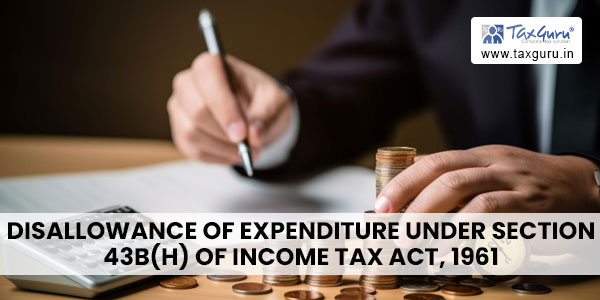Introduction: The Finance Act of 2023 introduced a significant amendment to Section 43B of the Income Tax Act, 1961, with the addition of clause (h). This amendment aims to ensure timely payments to micro and small enterprises, safeguarding their liquidity from potential delays in customer payments.
Section 43B Overview:
Section 43B of the Act is the section that governs the allowability of certain deductions on actual payment basis. This section provides explanation wherein certain expenses are allowed as deduction while calculating the Income from business or profession based on the previous year in which such sum is actually paid by the assessee. Provided that nothing contained in this section applies in relation to any sum which is actually paid by the assessee on or before the due date for furnishing the return of income under section 139(1) in respect of the previous year in which the liability to pay such sum was incurred and provided that the evidence of such payment is furnished by the assessee at the time of filing its return.
Key Highlights of Section 43B(h):
Now the new clause (h) to Section 43B of the Income Tax Act, 1961 states that “any sum payable by the assessee to a micro or small enterprise beyond the time limit specified in Section 15 of the Micro, Small and Medium Enterprises Development Act, 2006” shall be allowed as deduction while calculating the Income from business or profession based on the previous year in which such sum is actually paid by the assessee. There is no relaxation for the assessee with respect to payment till the due date for furnishing of return of income under Section 139(1) of the Income Tax Act.
Understanding “Enterprise”:
Here, it is also important to understand the meaning of the word “enterprise” mentioned above. This can be understood with reference to the definition given under MSMED Act, 2006.
Section 2(e) of the MSMED Act, defines the term “enterprise” as follows:
“Enterprise means an industrial undertaking or a business concern or any other establishment, by whatever name called, engaged in the manufacture or production of goods, in any manner, pertaining to any industry specified in the First Schedule to the Industries (Development and Regulation) Act, 1951 or engaged in providing or rendering any service or services”.
On reading the definition of “enterprise” one may note that the enterprise must be engaged in the manufacture or production of goods. Therefore, an enterprise which is engaged in trading is not covered by the term “enterprise”.
Understanding the Term “engaged”:
Yet another important expression here is “engaged” which is not defined in the MSME Act, 2006. However, in the portal www.dcmsme.gov.in being the portal belonging to the Government of India the meaning of manufacturing enterprise is explained as “employing plant and machinery in the process of value addition to the final product having a distinct name or character or use”. Thus, a unit engaged in manufacturing or producing an article which is having distinct name or character or use can be stated as an entity covered by the definition.

Criteria for Micro and Small Enterprises:
The turnover limit for micro enterprise is fixed as Rs. 5 crores and for small enterprise it is fixed as Rs. 50 crores. Also, the investment limit in plant and machinery or equipment for micro enterprise is fixed at Rs. 1 crore and for small enterprise it is fixed at Rs. 10 crores. Composite criteria of investment and turnover would be applied for classification as micro and small and enterprise.
Therefore, it would be safe to say that purchase of goods/services from an enterprise which has turnover above Rs. 50 crores would not be covered by section 43B(h). Similarly, purchase of goods/services from an enterprise which has investment in plant and machinery or equipment above Rs. 10 crores would not be covered by section 43B(h).
FAQs and Clarifications:
Here are few of the frequently asked questions raised by the taxpayers and our opinion there upon:
Q1. Whether Section 43B(h) shall be applicable to transactions with micro and small enterprises in relation to purchase of raw materials or is it applicable only with regard to expenses?
Section 43B is a section which governs the allowability of any expenditure/expense incurred by an assessee during the relevant previous year. Accordingly, clause (h) of the said section shall also be applicable only with respect to the expenses incurred by the assessee during the relevant previous year. The transaction of raw material purchase shall not be construed as a business expense for the purpose of this section. In other words, any transaction with a supplier for purchase of raw materials shall not come within the purview of Section 43B(h).
Q2. Whether any liability which was outstanding in respect of the period prior to 01.04.2023 would be hit by clause (h) of section 43B say if it is outstanding as on 31st March, 2024?
Any liability which was already outstanding in respect of the period prior to 01.04.2023 will not be hit by clause (h) of section 43B even if it is outstanding as on 31st March, 2024 or even subsequent periods. Such outstanding amounts may be due to pending disputes with respect to those supplies or services between the parties and agreed for settlement of dues upon resolution of dispute or any other issue between them.
Q3. In case there exists a written agreement between the buyer and seller with payment term of 15 days but the actual payment is made after 30 days (i.e. within 45 days from the Date of Acceptance), will that have an impact on applicability of Sec. 43B(h)?
In case of an agreement between the buyer and the seller, if the payment is done within the Due date as per agreement, only then the said deduction can be clamed by the buyer. In case of any delay, the deduction will be allowed in the year of actual payment. Here the question of 45 days from the Date of Acceptance does not arise because the Due Date as per agreement shall be counted.
However, kindly keep in mind the fact that in case the payment term as per the written agreement exceeds 45 days from the Date of Acceptance, Sec. 15 of the MSMED Act shall come into play and the Due Date for payment shall be 45 days from the Date of Acceptance. Accordingly, deduction in such case shall be allowed as per the provisions of Sec. 43B(h) of the Income Tax Act.
Q4. Scenario 1 (No agreement between the buyer and the seller)-
Date of Invoice is 01 March, 2024
Date of delivery of goods/rendering of service is 18.03.2024. For convenience, this can be taken as the Date of Acceptance as well.
Payment Date is 01.04.2024
Whether the deduction will be allowed in F.Y. 2023-24 or F.Y. 2024-25?
Since the Date of Acceptance is 18.03.2024, the Appointed Date shall be 02.04.2024. Accordingly, the deduction will be allowed in F.Y. 2023-24 as the payment was done before the Appointed Date as defined under Section 2(a) of the MSMED Act, 2006.
Scenario 2 (No agreement between the buyer and the seller)-
Date of Invoice is 01 March, 2024
Date of delivery of goods/rendering of service is 18.03.2024. For convenience, this can be taken as the Date of Acceptance as well.
Payment Date is 02.04.2024
Whether the deduction will be allowed in F.Y. 2023-24 or F.Y. 2024-25?
Since the Date of Acceptance is 18.03.2024, the Appointed Date shall be 02.04.2024. Now the payment was done on the Appointed Date, i.e. 02.04.2024. Accordingly, the deduction will be allowed in F.Y. 2024-25. Kindly note that as per the MSMED Act, if there is no agreement between the buyer and the seller, then the payment has to be made “before the Appointed Date” as defined under Section 2(a) of the MSMED Act, 2006.
Conclusion: Section 43B(h) plays a pivotal role in promoting timely payments to MSEs, ensuring their financial health. By adhering to the criteria, businesses can navigate the complexities of this section, claiming deductions appropriately. The FAQs provide practical insights into real-world scenarios, guiding taxpayers for compliant and efficient financial practices.






For FAQ 1, Can the author please explain as to how has he concluded that purchase of raw material is not a business expense and thus excluded from the provision of 43B(h)?
The section clearly states that it applies to any sum payable by an Assessee to MSME, further the intent as stated in the memorandum is to promote timely payments to MSME’s.
Wouldn’t this interpretation of the author defeat the entire purpose of bringing in section 43B(h) ?
I agree. Need an explanation for this if the author is right in his conclusion please.
if payment done after 45 days we have pay full month interest or half month interest.
regards Hasmukh Lodha
Section 43 B (h) is applicable on cloth trading or not.